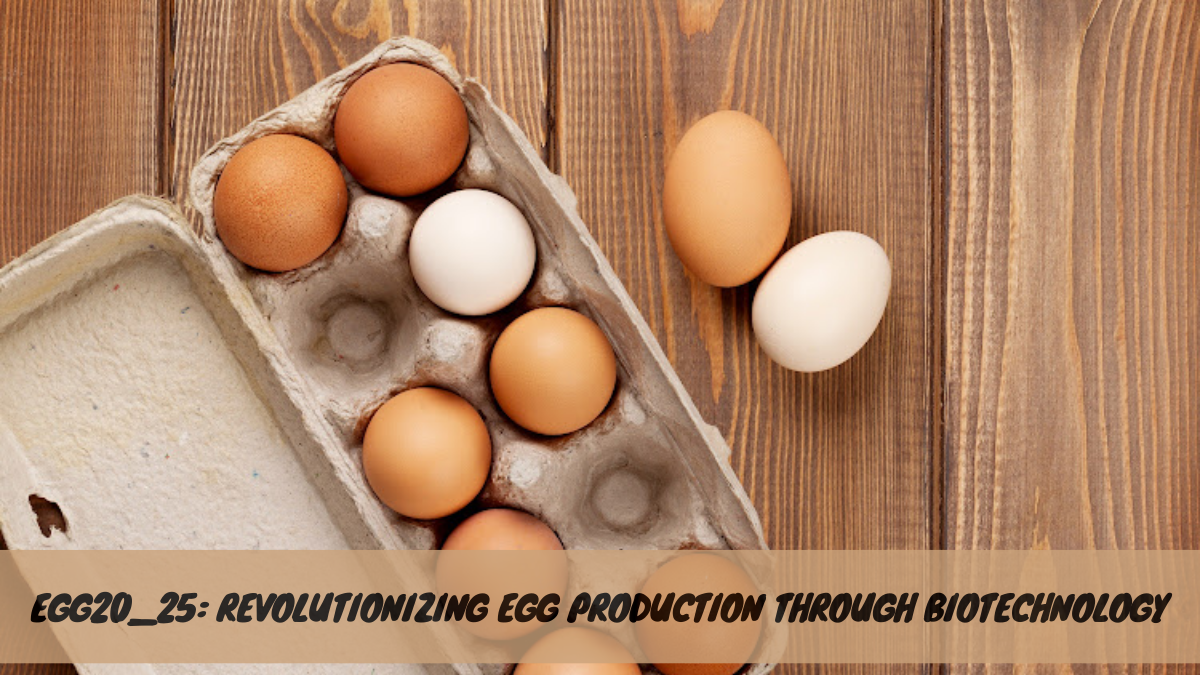Egg20_25: Revolutionizing Egg Production Through Biotechnology
Introduction
In the ever-evolving landscape of agriculture and food production, innovations continue to reshape how we produce and consume food. One such groundbreaking development is Egg20_25, a biotechnological marvel aimed at enhancing egg production efficiency and quality. As the global population grows and demand for sustainable food sources increases, Egg20_25 stands at the forefront of efforts to ensure a stable supply of high-quality eggs.
Egg20_25 is a biotechnological innovation enhancing egg production through genetic and nutritional optimization, improving efficiency and quality, and promoting sustainable farming practices to meet growing global food demands.
This article delves deep into the science, benefits, and future implications of Egg20_25, offering a comprehensive overview for those interested in understanding this cutting-edge technology.
Understanding Egg20_25: A Biotechnological Breakthrough
Egg20_25 is a product of advanced biotechnological research designed to improve various aspects of egg production. It leverages modern genetic and nutritional science to optimize the health and productivity of laying hens, resulting in eggs that are not only more abundant but also of superior quality.
The Science Behind Egg20_25
Egg20_25 utilizes several scientific principles and techniques to achieve its goals:
- Genetic Optimization: By selecting and enhancing specific genetic traits, Egg20_25 aims to improve the reproductive efficiency and health of hens. This involves identifying genes responsible for traits like egg size, shell strength, and disease resistance and enhancing them through precise genetic modifications.
- Nutritional Enhancement: The development of Egg20_25 also focuses on optimizing the diet of laying hens. By incorporating specific nutrients and supplements, the overall health of the birds is improved, leading to better egg quality and higher production rates.
- Disease Resistance: Another critical aspect of Egg20_25 is its emphasis on boosting the immune system of hens. Through biotechnological interventions, hens are made more resistant to common poultry diseases, reducing mortality rates and improving egg output.
Key Benefits of Egg20_25
Egg20_25 offers numerous benefits that make it an attractive option for farmers and consumers alike:
- Increased Egg Production: With improved genetic and nutritional factors, hens can produce more eggs consistently, helping meet the rising demand for eggs globally.
- Enhanced Egg Quality: Eggs produced under the Egg20_25 program are of higher quality, with stronger shells, better yolk color, and improved nutritional profiles.
- Sustainability: By increasing the efficiency of egg production, Egg20_25 contributes to more sustainable farming practices, reducing the environmental impact of poultry farming.
- Economic Benefits: For farmers, the increased productivity and reduced disease incidence translate to higher profits and lower operational costs.
The Impact of Egg20_25 on the Egg Industry
Revolutionizing Poultry Farming
Egg20_25 is poised to revolutionize the egg industry by introducing a new standard for productivity and quality. Farmers adopting this technology can expect to see significant improvements in their operations, making it a vital tool for staying competitive in a rapidly changing market.
Meeting Consumer Demands
Today’s consumers are increasingly conscious of the quality and origin of their food. Egg20_25 aligns with this trend by offering eggs that are not only superior in quality but also produced using sustainable and ethical practices. This appeal to health-conscious and environmentally aware consumers positions Egg20_25 as a premium product in the market.
Challenges and Considerations
While Egg20_25 presents numerous advantages, it also comes with challenges that must be addressed:
- Regulatory Hurdles: The introduction of genetically modified organisms (GMOs) in agriculture often faces regulatory scrutiny. Ensuring that Egg20_25 meets all safety and ethical standards is crucial for its widespread adoption.
- Public Perception: Educating the public about the benefits and safety of biotechnological advancements like Egg20_25 is essential to overcoming skepticism and resistance.
The Future of Egg Production with Egg20_25
Continued Research and Development
The journey of Egg20_25 is far from over. Continuous research and development efforts aim to further enhance its capabilities, exploring new genetic markers and nutritional supplements to push the boundaries of egg production.
Integration with Smart Farming Technologies
Egg20_25 is expected to integrate seamlessly with other smart farming technologies, such as precision agriculture tools and data analytics, to optimize every aspect of egg production. This integration will enable farmers to make informed decisions based on real-time data, further boosting productivity and efficiency.
Global Implications
As Egg20_25 gains traction, its impact will extend beyond local markets to influence global egg production. Countries facing food security challenges may find Egg20_25 a valuable asset in ensuring a steady supply of high-quality eggs.
Conclusion
Egg20_25 represents a significant leap forward in egg production, offering a blend of science, sustainability, and economic viability. As the world grapples with the challenges of feeding a growing population, innovations like Egg20_25 provide a promising solution that balances the need for increased food production with the imperative of environmental stewardship. By embracing Egg20_25, farmers can look forward to a future where efficiency and quality go hand in hand, setting new standards for the egg industry.
FAQs About Egg20_25
1. What is Egg20_25, and how does it work?
Egg20_25 is a biotechnological innovation designed to enhance egg production efficiency and quality. It works by optimizing the genetic, nutritional, and health factors of laying hens, leading to increased egg output and improved egg quality.
2. Are eggs produced with Egg20_25 safe to eat?
Yes, eggs produced with Egg20_25 are safe to eat. The technology undergoes rigorous testing and adheres to regulatory standards to ensure the safety and quality of the eggs.
3. How does Egg20_25 contribute to sustainability in agriculture?
Egg20_25 contributes to sustainability by increasing the efficiency of egg production, reducing the environmental impact of poultry farming, and promoting the use of ethical and sustainable practices.
4. What challenges does Egg20_25 face in terms of public acceptance?
One of the primary challenges Egg20_25 faces is public perception of genetically modified organisms (GMOs). Educating consumers about the benefits and safety of this technology is crucial for its acceptance.
5. How can farmers benefit from adopting Egg20_25?
Farmers can benefit from Egg20_25 through increased egg production, improved egg quality, reduced disease incidence, and lower operational costs, ultimately leading to higher profits and a competitive edge in the market.







